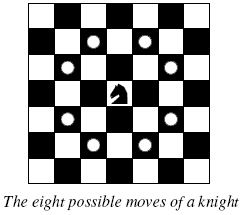POJ 2488 A Knight's Journey(DFS)
A Knight's Journey
Time Limit: 1000MS
Memory Limit: 65536K
Total Submissions: 34633
Accepted: 11815
Description
 Background
Background
The knight is getting bored of seeing the same black and white squares again and again and has decided to make a journey
around the world. Whenever a knight moves, it is two squares in one direction and one square perpendicular to this. The world of a knight is the chessboard he is living on. Our knight lives on a chessboard that has a smaller area than a regular 8 * 8 board, but it is still rectangular. Can you help this adventurous knight to make travel plans?
Problem
Find a path such that the knight visits every square once. The knight can start and end on any square of the board.
Input
The input begins with a positive integer n in the first line. The following lines contain n test cases. Each test case consists of a single line with two positive integers p and q, such that 1 <= p * q <= 26. This represents a p * q chessboard, where p describes how many different square numbers 1, . . . , p exist, q describes how many different square letters exist. These are the first q letters of the Latin alphabet: A, . . .
Output
The output for every scenario begins with a line containing "Scenario #i:", where i is the number of the scenario starting at 1. Then print a single line containing the lexicographically first path that visits all squares of the chessboard with knight moves followed by an empty line. The path should be given on a single line by concatenating the names of the visited squares. Each square name consists of a capital letter followed by a number.
If no such path exist, you should output impossible on a single line.
Sample Input
3 1 1 2 3 4 3
Sample Output
Scenario #1: A1 Scenario #2: impossible Scenario #3: A1B3C1A2B4C2A3B1C3A4B2C4
题目简单翻译:
给你一个象棋中的马,一个n*m的棋盘,求是否能从一点出发,走遍整个棋盘,不重复走。如果能,按字典序输出第一个序列。如果不能,则输出“impossible”。
解题思路:
dfs,从一点出发,然而因为要字典序较小的,我们就选择(1,1)为起始点吧。注意延伸的方向,优先向字典序小的方向延伸。
代码:
#include<cstdio> #include<cstring> #include<queue> using namespace std; int n,m; int vis[26][26]; int dx[]={-2,-2,-1,-1,1,1,2,2}; int dy[]={-1,1,-2,2,-2,2,-1,1}; int a1[1000],a2[1000]; bool check(int x,int y) { return x>=0&&x<n&&y>=0&&y<m; } bool dfs(int x,int y,int depth) { if(depth==m*n) { for(int i=0;i<depth;i++) printf("%c%d",a1[i]+'A',a2[i]+1); puts(""); return true; } for(int i=0;i<8;i++) { int curx=x+dx[i]; int cury=y+dy[i]; if(check(curx,cury)&&vis[curx][cury]==0) { a1[depth]=curx; a2[depth]=cury; vis[curx][cury]=1; if(dfs(curx,cury,depth+1)) return true; vis[curx][cury]=0; } } return false; } int main() { int T; scanf("%d",&T); int flag=0; while(T--) { if(flag) puts(""); scanf("%d%d",&m,&n); memset(vis,0,sizeof vis); vis[0][0]=1; a1[0]=0,a2[0]=0; printf("Scenario #%d:\n",++flag); if(!dfs(0,0,1)) puts("impossible"); } return 0; }



